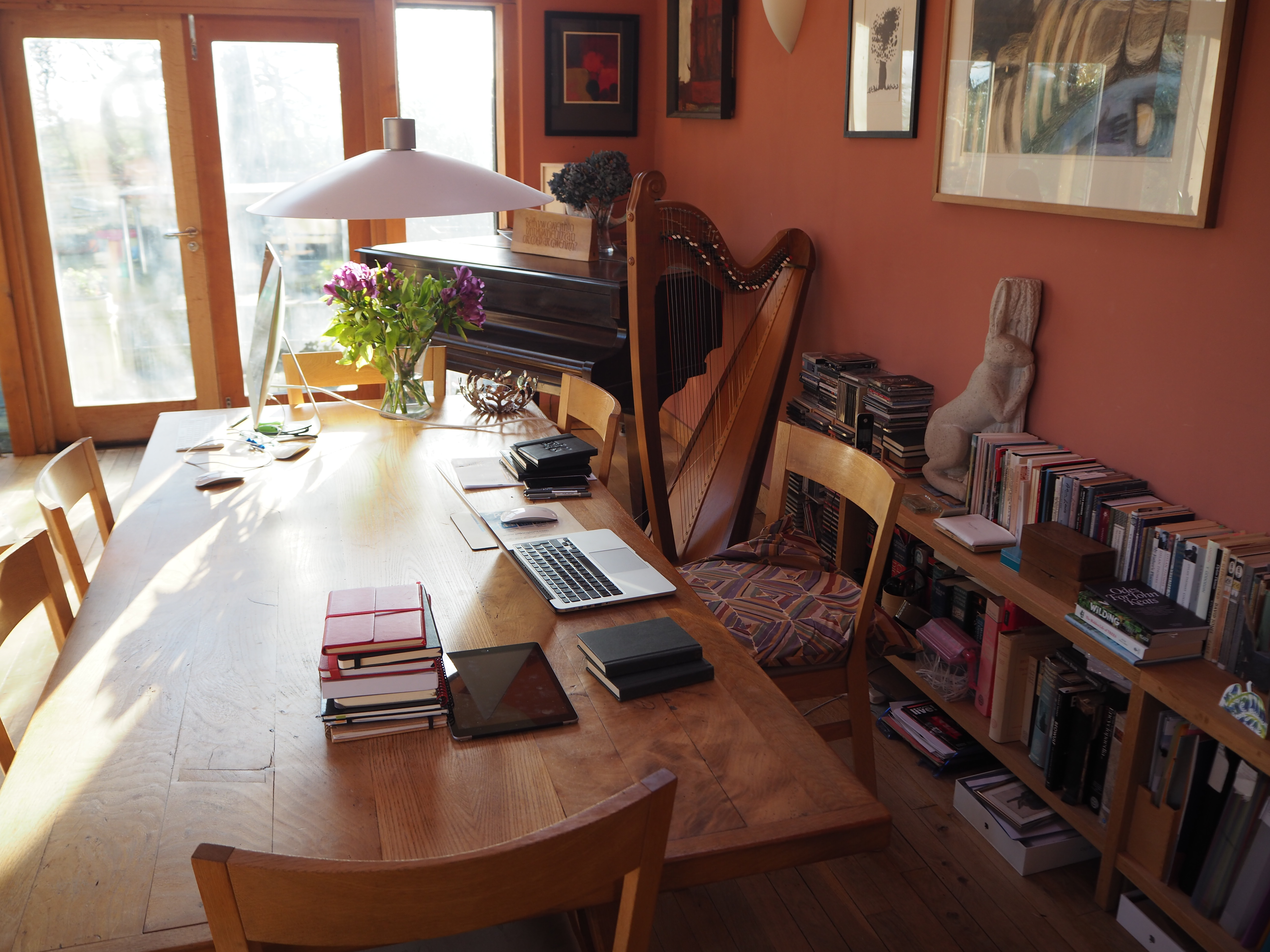Gillian Clarke talks us through her creative space as a contribution to the popular Wales Arts Review series Writers’ Rooms. Clarke’s work has been on the GCSE and A Level exam syllabus for over thirty years. In 2010, she was awarded the Queen’s Gold medal for Poetry, and was given the Wilfred Owen Award in 2012. Her prose works include a writer’s journal, At the Source (Carcanet, 2008). She has written radio and theatre drama, and translated poetry and prose from Welsh. The Gathering/Yr Helfa, commissioned by the National Theatre of Wales, was performed on Snowdon in September, 2014. Picador published her Selected Poems in 2016. Her tenth collection of poems, Zoology, was published by Carcanet in 2017. Clarke’s version of the book-long 7th century Welsh poem, Y Gododdin, is to be published by Faber in 2020.

I used to have a study, a cosy book-lined room which, a hundred years ago, had been Blaen Cwrt’s old cowhouse-study. I typed my prose book, At the Source, in the corner where the manger had been. Gradually, over the years, my study grew too confining for me. The books multiplied, overflowed, gathering in boxes and piles on the floor. The manger filled with books. When my old computer died, I bought a laptop, and as there was no surface left on which to place it, I carried it, and the books I currently needed, four rooms along to our big oak and glass room built on the south end of the old longhouse. Here, at the dining table, I have a lovely space to work, with miles of countryside to look at through the glass walls of this room. I had forgotten how much my imagination is nourished by long views over a landscape, and by visiting wild creatures. Here, I have it all: the close and the far; creatures – sheep, hares, foxes, birds; distant mountains; a big table where I can spread the books I need, and more shelved close by; paintings on the walls; the beautiful limestone hare, sculpted for me years ago by Meic Watts; the family piano, and the harp for when musician sons come visiting.
Every evening the table must be cleared for supper, so notebooks, journals, pens, iPad, laptop, and the books in current use, are kept under control, shelved, stowed, tucked away, hidden on a chair not in use.
I work best if my mind can roam a view. With work to do, and deadlines to meet, I take my notebook and iPad with me on my travels, thinking I may find time and peace to write on a train or in a hotel. It never works. Four strange walls in a city enclose and unsettle me. This table, this room, this landscape help me to concentrate. I listen, look up to watch the garden and fields for wild creatures, migrating flocks. Views across familiar distances set me free to imagine. In the study, at my old fixed computer, I had to type facing the wall, or move to my desk to write by hand in notebook or journal, the way I always begin every day, and every poem. Here, all I need is to hand on the table. I look up to think or gaze, look down and write a line, scribble an idea, pause, re-write, think and gaze again. I relish the fine view to the east over the garden and across the fields to the far side of the valley. The rising sun on a winter morning. The moon in the beech tree. In summer I might step out to the terrace garden table and write in the shade of the beech trees.
I start most mornings by writing my journal, here at this table. Trivia. The weather. The madness of politics. Just moving the pen gets me going if I have a commission to work on – currently two collaborations await my attention, one with film, one with a musician. I turn from my journal to read something by a poet whose work excites me. Yeats, maybe. Seamus Heaney. I read one poem a few times over, silently, then out loud, to hear its music. Then I pause, waiting for words, write a line in my notebook, perhaps cross it out with just a single stroke, in case I need to resurrect it later. Once an idea is seeded, and sends me an image, a word, a line, I listen. I look up to watch birds on the feeders, a fox on the track, the hare which daily lopes through the hedge-gap into the garden, runs over the terrace and off behind the house. Not long ago a heron came shuffling over the terrace, clumsy as an old bishop whose robes are too heavy. It knocked over a pot before lifting into the air, slender and elegant again once it was in flight.
Such brief distractions set pen, line and thought free to make something. Yesterday the fields were gold. Today, on a grey winter afternoon, they darken early. The Atlantic is in the trees. The birds fed frantically, and have gone. From the adjacent kitchen comes the smell of simmering marmalade. Familiar, ever-changing, it is the perfect writing space.
Gillian Clarke’s Writers’ Room piece is a part of a Wales Arts Review series.











